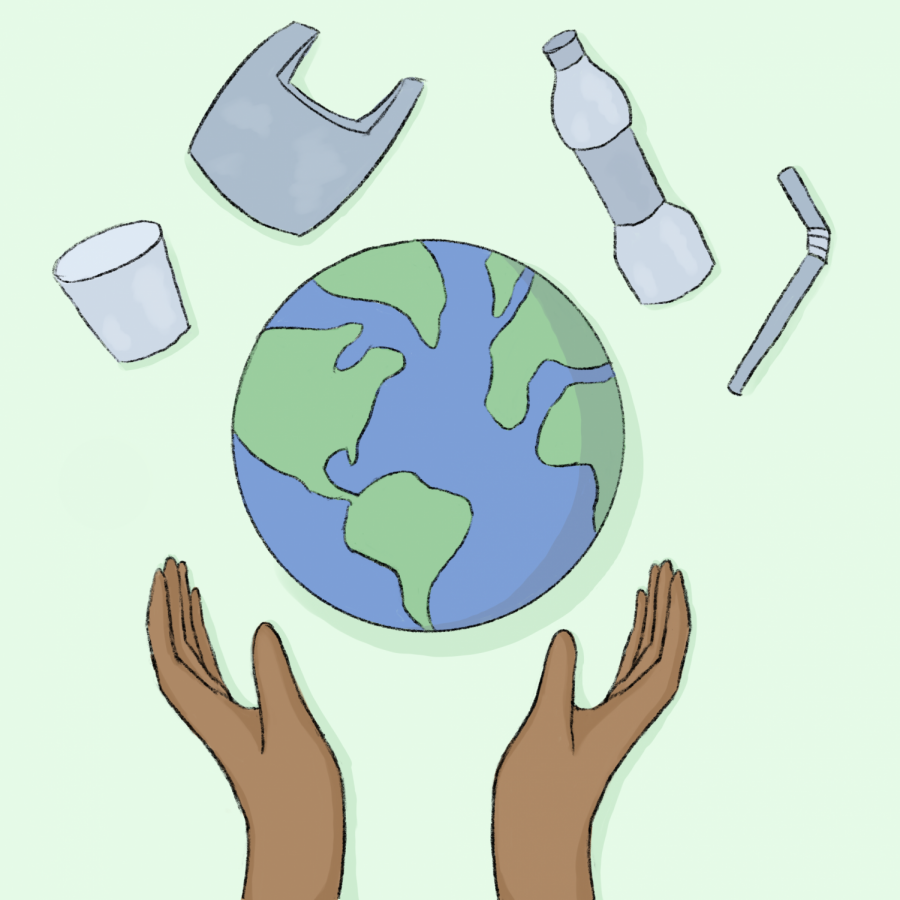Institute challenges students to avoid plastic this March
March 22, 2021
Plastic is all around us, even in places we might not expect. It’s in clothes, oceans, streets and has even been found in fish. It’s detrimental to the planet and difficult to always avoid.
For Emily Dickett, sophomore in Engineering and intern at the University’s Institute for Sustainability, Energy, and Environment, the fact that plastic is so prevalent was enough for her to want to make some changes in her life.
She decided to start living a plastic-free lifestyle and is working with the Institute on its plastic-free challenge throughout March to help other students make small, lasting changes in their lives.
Plastic-free living is the effort to avoid plastic in everyday life because plastic is difficult to recycle. Recycled items are not always recycled properly, which leads to a lot of plastic in landfills and oceans.
“Because of the deception of recycling, it is much more beneficial to refuse plastic first before you repurpose,” Dickett said.
Putting something in the recycling bin with the hope that it gets recycled, even if it isn’t a recyclable product, is called wish-cycling, and it can cause a lot of problems in the recycling process.
Things like black plastic and paper towels are common items that people believe can be recycled but should really be thrown out.
Meredith Moore, sustainability programs coordinator at the Institute, is passionate about helping the environment and living a more sustainable lifestyle.
“Plastic is all around us, in the most sneaky of places,” Moore said. “It’s very difficult to avoid, especially in our very consumerist lifestyle, which is really the whole premise of this whole challenge — to make people more aware of the amount of plastic that is around us everywhere.”
One hundred-thirty-four people have signed up for the virtual challenge so far. The goal is to throw out as little plastic as possible and create more eco-friendly habits.
Every week, contestants submit a sheet that has their point total. Each plastic product is worth a certain amount of points and the goal is to have as few points as possible. Moore said she realizes that this isn’t easy, but notes the benefits it offers for people and the planet.
Dickett said that she realizes how daunting it can be to make these changes in your life, but explains that starting small and taking small steps is the best way to go about it.
“We would rather have a lot of people do plastic-free imperfectly than a few people do it perfectly,” Dickett said. “Sometimes people don’t know where to start, because you hear plastic-free and that sounds really scary and really hard, but you don’t have to be perfect.”
Dickett said that just by making small changes in your life and having other people see you make those changes can create a snowball effect.
Dickett suggested that students pick one or two things to pledge to do for the environment and stick with it forever.
For Moore, that is never using a plastic bag or a plastic straw.
“If we can help 50,000-some students know how to live a sustainable lifestyle or a minimal lifestyle, and those 50,000 students can take those changes into their future careers, the world would be a much better place and a much less wasteful place,” Moore said.
Alexa Smith, junior in ACES, lives a plastic-free and zero-waste lifestyle. She said that it has benefited her in many ways.
“I don’t purchase useless items, like disposable things, and I make more durable purchases,” Smith said. “I tend to buy in bulk and mostly fresh fruits and vegetables that aren’t covered in plastic. So I guess that has benefited my health.”
Smith said that it has also helped declutter her space, clear her head and reduce her stress.
“The plastic-free challenge is awesome because it’s at this stage of our lives that we are becoming independent people and the habits that we establish at this point in our lives will be lifelong for the most part,” Smith said. “If we can instill those values of reducing plastic and being sustainable in our daily lives, that will carry on into the future.”







